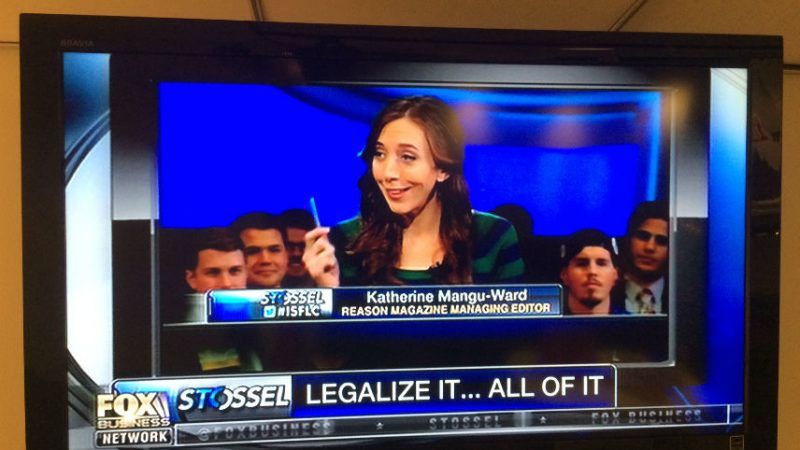Fox Hosts for Legalizing Heroin
Kennedy ("I think the problem is that heroin is illegal") and Kat Timpf say bluntly what Libertarian Party nominee Gary Johnson couldn't quite bring himself to advocate last year


Like a lot of 78-year-old white men, my father was watching Fox News Monday, and decided to click the next channel over to catch the rapid-fire libertarian stylings of our friend Kennedy. There, in a segment interviewing Wall Street Journal U.S. News Editor Glenn Hall about a recent story on drug smugglers increasingly sending their product through the mail, the eponymous host of the fast-growing show (up 35 percent in overall ratings in the second quarter this year) pivoted immediately to the underlying policy:
KENNEDY: So, this is obviously sad and tragic, the fact that opioid overdoses have increased in recent years. But I don't think the problem is that FedEx and UPS and the postal service need more screening tools. I think the problem is that heroin is illegal. And so people go to nefarious means in order to get a drug they would get anyway. […]
If you legalize these things and people have access to them and may know what's in them, do you think knowing the ingredients in a drug you're taking increases or decreases the chance that you will overdose on it?
HALL: Well, I don't know the answer to that question exactly.
KENNEDY: It decreases the chance because you know what's in there, so you know exactly what you put in your body.
This isn't Kennedy's first time making the on-air case for heroin legalization—back in March 2013, when then-host John Stossel talked about how he once struggled with legalizing hard drugs, but then concluded that owning one's body is a "powerful" counter-argument, the non-drug-using former MTV VJ replied "amen," and added: "having drugs be illegal is downright deadly. It's dangerous. And, you know, Ron Paul always made a good point, which was, let's say heroin was made legal right now, like who really wants to go out and jack their vein with heroin?" And in September of last year, when our own Katherine Mangu-Ward reacted to a story about elephant tranquilizers getting cut into smack by saying "this is why we want to legalize heroin now because it would save lives," Kennedy replied "Yes, absolutely. But instead, the problem here is, you know, not that legislators and…city council members are going to wake up and smell the cat food and realize that prohibition is directly leading to death."
But Monday's blunt comment was not some response to a how-far-would-you-go libertarian dare, or a legalize-bazookas type of thought experiment, but rather a deliberate insertion of anti-prohibition policy argument into a story that the Bill O'Reillys of the world would surely treat as reason for another crackdown on opioids. As such, I flagged the occasion on Twitter:
"I think the problem is that heroin is illegal." -- @KennedyNation, on Fox Business Network, on the show she anchors.
— Matt Welch (@MattWelch) June 27, 2017
One guy responded that Greg Gutfeld and his former Red Eye-mate Andy Levy (who leaves Fox tomorrow, BTW) were pro-legalization, to which I added Kat Timpf, co-host of The Specialists, though with the caveat that I didn't know if they all went as far as heroin. Yesterday, Timpf cleared that up:
Yes, I'm pro-legalization. Including heroin!
— Kat Timpf (@KatTimpf) June 28, 2017
Gutfeld, meanwhile, has made the conservative case for hard-drug legalization multiple times on air, including in November 2013, when The Five co-host said, "I believe heroin could be legalized if done in a delivery system which makes it more like a cigarette."
What's striking about all this is that the comments from Kennedy and Timpf come one year to the week that the Libertarian Party nominee for president, a man who previously was most famous for being the first major elected official in the U.S. to favor legalizing marijuana, could not bring himself to fully advocate legalizing heroin at a crucial CNN townhall, despite making some sensible points about the add-on dangers of prohibition.
I don't say that as a ding on Gary Johnson; it's hard out here for an instinctive pragmatist positioning himself as a centrist to stare into the bright lights and sell the more extreme-sounding edges of a minority philosophy to a mass-market audience. But rather, it feels like what was once taboo is now at least debatable (thanks, Ron Paul!), which will hopefully inject at least a little sanity into a policy debate that more often resembles a panic. It's also a reminder that the most interesting voices over in that building tend to be the most libertarian—a lesson that I hope the post-Roger Ailes management takes closer to heart.


Show Comments (41)